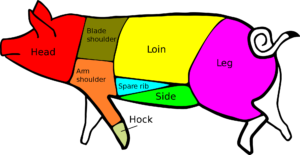Pork is the culinary name for meat from a domestic pig (Sus scrofa domesticus). It is the most commonly consumed meat worldwide, with evidence of pig husbandry dating back to 5000 BC.
Uses
- Being high in protein and rich in many vitamins and minerals, lean pork can be an excellent addition to a healthy diet.
Benefits
- Like all meat, pork is mostly made up of protein.The protein content of lean, cooked pork is around 26% by fresh weight.By dry weight, the protein content of lean pork can be as high as 89%, making it one of the richest dietary sources of protein.
- It contains all the essential amino acids necessary for the growth and maintenance of our bodies. In fact, meat is one of the most complete dietary sources of protein.For this reason, eating pork, or other meats, may be of particular benefit for bodybuilders, recovering athletes, post-surgical patients, or other people who need to build up or repair their muscles.
- These are the main vitamins and minerals found in pork:
- Thiamin: Unlike other types of red meat, such as beef and lamb, pork is particularly rich in thiamin. Thiamin is one of the B-vitamins and plays an essential role in various body functions.
- Selenium: Pork is usually a rich source of selenium. The best sources of this essential mineral are animal-derived foods, such as meat, seafood, eggs, and dairy products.
- Zinc: An important mineral, abundant in pork. It is essential for a healthy brain and immune system.
- Vitamin B12: Only found in foods of animal origin, vitamin B12 is important for blood formation and brain function. Vitamin B12 deficiency may cause anemia and damage to neurons.
- Vitamin B6: A group of several related vitamins, important for the formation of red blood cells.
- Niacin: One of the B-vitamins, also called vitamin B3. It serves a variety of functions in the body and is important for growth and metabolism.
- Phosphorus: Abundant and common in most foods, phosphorus is usually a large component of people’s diets. It is essential for body growth and maintenance.
- Iron: Pork contains less iron than lamb or beef. However, the absorption of meat iron (heme-iron) from the digestive tract is very efficient and pork can be considered an outstanding source of iron.
Cautions
-
Heart disease, also called cardiovascular disease, is the main cause of premature death worldwide.
It includes adverse conditions, such as heart attacks, strokes, and high blood pressure.
There are inconsistent results from observational studies on red meat and heart disease.
Some studies have shown an increased risk for both processed and unprocessed red meat, whereas others showed an increased risk for processed meat only.
Others have not found any significant link.
However, there is no clear-cut evidence that meat, in itself, actually causes heart disease. Observational studies can only reveal possible associations, but cannot provide evidence for a direct cause-and-effect relationship.
-
Cancer is a serious disease, characterized by uncontrolled growth of cells in the body. Many observational studies have found a link between red meat consumption and the risk of colon cancer.
Other studies found no significant effects.
It is difficult to prove that pork actually causes cancer in humans.
This is because observational studies can only detect associations, but cannot provide evidence for a direct cause-and-effect relationship.
However, overcooked meat may contain a number of carcinogenic substances, most notably heterocyclic amines
Interactions
n/a
Other names
- n/a
References
Source: Wikipedia, https://en.wikipedia.org/wiki/Pork
Healthline, http://www.healthline.com/nutrition/foods/pork#section10

